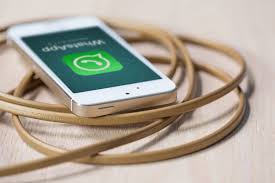 Great news for iOS users. WhatsApp, the populas instant messaging app, has just released an updated version of the app which finally fixes a bug that consumes all of an iPhone’s unused storage space. And that’s not all.
Great news for iOS users. WhatsApp, the populas instant messaging app, has just released an updated version of the app which finally fixes a bug that consumes all of an iPhone’s unused storage space. And that’s not all.
Updated version 2.12.15 of WhatsApp for iPhone brings also a new, useful, feature that allows users to send and receive PDF files. And iOS users will also be delighted to find other much awaited features. In fact now iPhone users will also be able to share videos and photos with their contacts and, that’s really awesome, to zoom in on videos while they’re playing.
So, let’s see what changes with this new version 2.12.15 of WhatsApp for iPhone. Unfortunately, until now users with 8GB or 16GB iPhone devices were having serious problems due to a storage bug. Luckily this issue has been solved by WhatsApp developers, and now iOS users will immediately notice that they have much more storage space on their devices. And, as we said above, that’s not all and other nice surprises are now available for iOS users.
Thanks to this new 2.12.15 version, users will be able to send and receive PDF files, photos and videos. Using this feature users are now allowed to share with their contacts not only what they have saved locally, but also what they have stored on Google Drive, iCloud, OneDrive or Dropbox. How can you use this feature? In an easy way: by opening the “Photo/Video Library” and tapping “Choose from another app…”
What else? With this new version of WhatsApp for iPhone, users will be able to change colours for chat background and also to zoom in videos while they are playing. How can you install this latest updated version of WhatsApp for iPhone? You can find this latest 2.12.15 version already available on the Apple App Store.

 It seems that WhatsApp is keeping its promises. After
It seems that WhatsApp is keeping its promises. After  New interesting updates are available for those of you who use WhatsApp with Android devices. In the last few hours a new beta version has been released and it brings the document sharing support. This new beta version 2.12.493 adds a new documents icon to the paperclip attachments list, and, for the moment, you can add only PDF documents. But it shouldn’t take long before WhatsAppers will be able to attach other documents types.
New interesting updates are available for those of you who use WhatsApp with Android devices. In the last few hours a new beta version has been released and it brings the document sharing support. This new beta version 2.12.493 adds a new documents icon to the paperclip attachments list, and, for the moment, you can add only PDF documents. But it shouldn’t take long before WhatsAppers will be able to attach other documents types. During the past few months, WhatsApp encryption has been long debated by
During the past few months, WhatsApp encryption has been long debated by  Is it an end of an era? It seems so. WhatsApp has decided to drop support to certain operating systems including Windows Phone 7.1 and Blackberry 10 and to focus on other mobile platforms the majority of people use. The decision is final, and the Facebook-owned instant messaging app will stop working on the following operating systems by the end of December 2016:
Is it an end of an era? It seems so. WhatsApp has decided to drop support to certain operating systems including Windows Phone 7.1 and Blackberry 10 and to focus on other mobile platforms the majority of people use. The decision is final, and the Facebook-owned instant messaging app will stop working on the following operating systems by the end of December 2016: It seems that WhatsApp, with its 1 billion monthly active users, is a serious threat to carriers incomes. Why? Simple. Let’s see what’s happening. Since WhatsApp is a free application that works through the internet, most of WhatsAppers use the app via a wireless network. In that way they don’t consume their mobile data included in the monthly plan.
It seems that WhatsApp, with its 1 billion monthly active users, is a serious threat to carriers incomes. Why? Simple. Let’s see what’s happening. Since WhatsApp is a free application that works through the internet, most of WhatsAppers use the app via a wireless network. In that way they don’t consume their mobile data included in the monthly plan. Now that WhatsApp has reached the incredible goal of one billion monthly active users spread all over the world, we can definitely affirm that the app is now much more than a social media. Just think about it. This multi-platform instant messaging app is now used in quite every field: to communicate with friends and family, or for job purposes.
Now that WhatsApp has reached the incredible goal of one billion monthly active users spread all over the world, we can definitely affirm that the app is now much more than a social media. Just think about it. This multi-platform instant messaging app is now used in quite every field: to communicate with friends and family, or for job purposes.